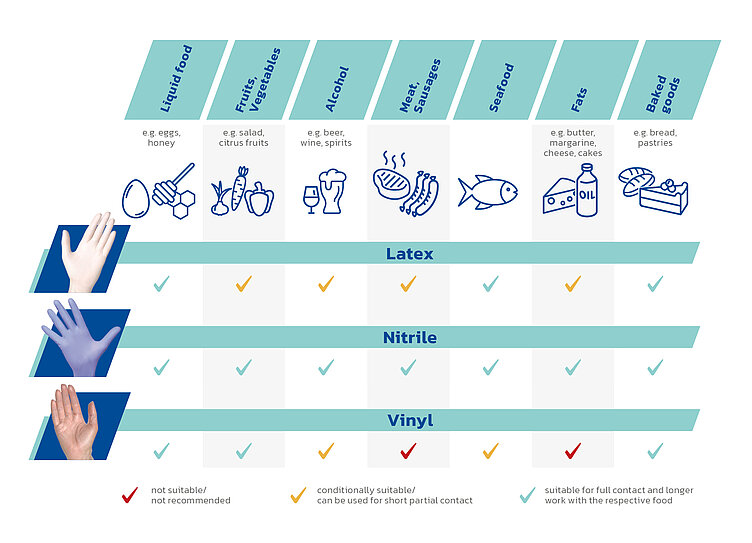
Food regulations and food contact
What to look out for in gloves that come into contact with food
In some areas of the food industry, it is indispensable to wear gloves. Because a high level of protection and high standards of quality are necessary, you should take a couple of things into consideration before handling food with gloves.
The general rule for all food contact materials is that nothing may migrate to food that could either endanger human health, or deteriorate the composition or organoleptic characteristics of food. This is required by European regulation (EC) 1935/2004, which is applicable for all food contact materials in general.
Specific requirements exist for plastic food contact materials (which applies to PVC gloves only, since natural rubber latex or nitrile latex is excluded). These are defined in European regulation (EU) 20/2011.
For non-PVC gloves, national specific measures are adopted. Among the most renowned national rules are the German “BfR Recommendation XXI” and the French “Arrete du 5 aout 2020”.
To ensure that high standards are met, please pay attention to this list when choosing and wearing a glove to handle food with:
- “Food Contact” pictogram (see below)
- CE protection category and CE marking
- AQL Level
- Wall thickness
- Blue glove colour (recommended especially in sectors subject to the HACCP standards)
- Correct glove size
- Period of use (max. 1-2 hours)
- Regular changing of gloves
- Intended use (disposable or reusable gloves)
- Instructions for use and EU declaration of conformity from the manufacturer
- Possible allergens or harmful substances in the glove material (latex proteins, accelerators, DOP/DEHP softeners, powder)
- Consistent hand care
Recommendations on food handling suitability
This quick overview helps you decide which glove material is best suited to handle certain foods and drinks.

Recommendations on food handling suitability
This quick overview helps you decide which glove material is best suited to handle certain foods and drinks:

Regulations and legislation
As soon as gloves come into contact with food, it is obligatory that they meet specific requirements. A look at the labelling found on the product packaging helps you to determine if a glove meets these requirements.
In the European Union, the relevant EC regulation applies, which is indicated by the wine glass and fork pictogram. If this symbol is displayed, it can be ensured that no substances are transferred to the food which may lead to an alteration of the food.
Furthermore, gloves with the CE marking are tested by a test centre and must be manufactured using a quality management system. The CE marking does not necessarily mean safety, but indicates that the product complies with EU safety regulations.
The PPE directive, however, indicates the level to which the product guarantees the safety of the user. Three levels of protection exist; these are protection against minimal risks, moderate risks and complex risks.